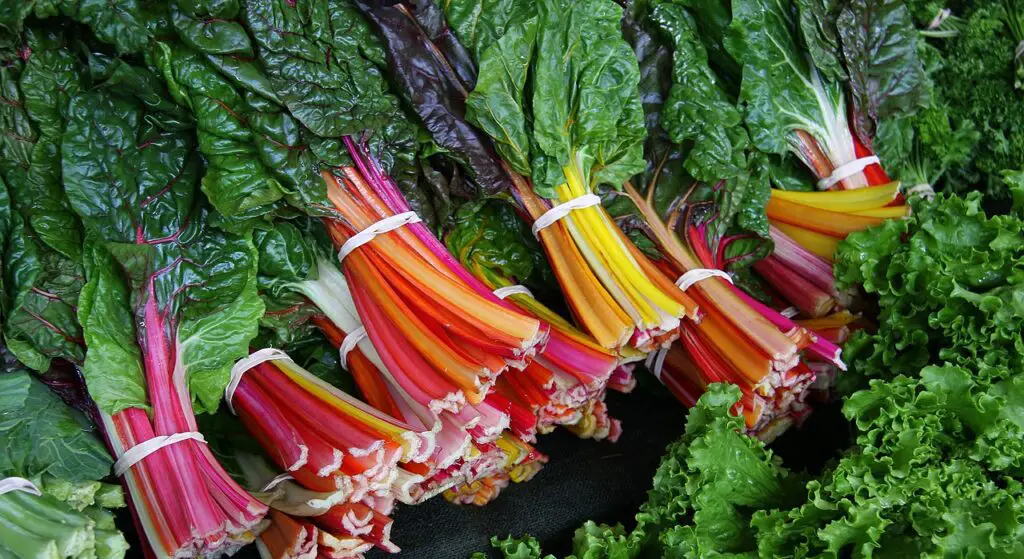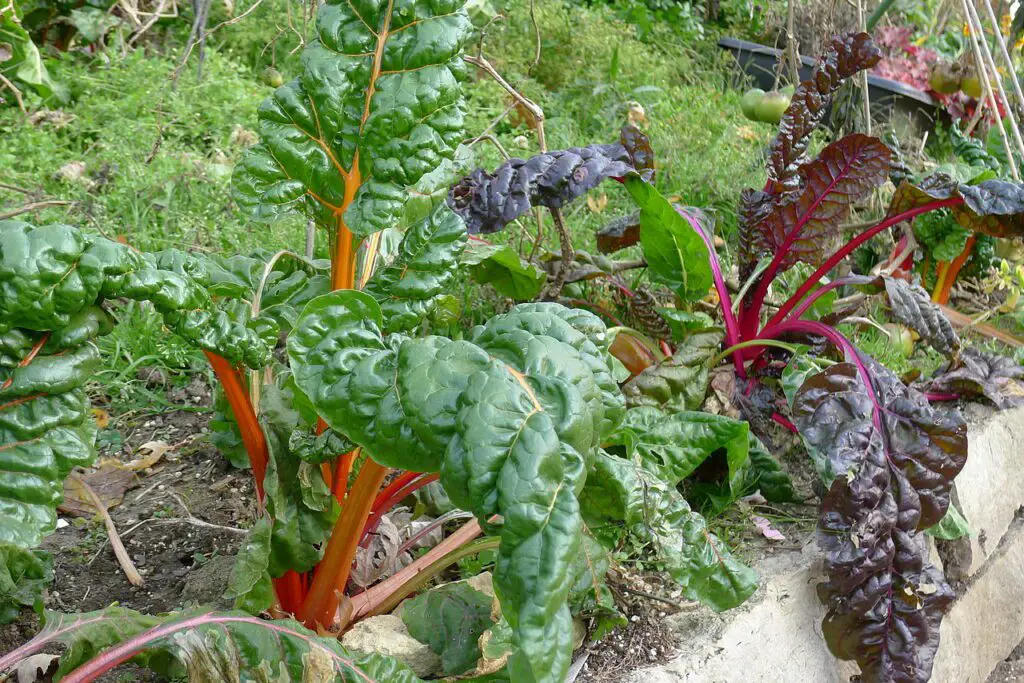Swiss chard is a leafy green vegetable that is packed with vitamins and minerals, making it a nutritious addition to any diet.
However, when it comes to feeding it to our furry friends, many dog owners wonder if it’s safe for their canine companions to consume.
Dogs have different dietary needs than humans, and certain foods that are healthy for humans can be harmful or even toxic to dogs.
So, the question remains: can dogs eat Swiss chard? Let’s find out.
- Can Dogs Eat Swiss Chard?
- How Much Swiss Chard Can Dogs Eat?
- How Often Can Dogs Eat Swiss Chard
- Health Benefits of Swiss Chard To Dogs
- Potential Risks of Feeding Swiss Chard To Dogs
- Nutritional Benefits of Swiss Chard For Dogs
- Are Dogs Sensitive To Swiss Chard?
- How To Prepare Swiss Chard For Dogs
- How Fast Will Dogs Digest Swiss Chard
- FAQs
- In Conclusion
Can Dogs Eat Swiss Chard?

Yes, dogs can eat raw and cooked Swiss chard in moderation. Swiss chard is a nutrient-rich leafy green that is safe for dogs to consume.
It contains vitamins A, C, and K, as well as minerals like calcium and iron, which are beneficial for your dog’s health.
However, like with any new food, it is important to introduce Swiss chard to your dog’s diet slowly and in small amounts to avoid any digestive upset.
Also, make sure to wash the Swiss chard thoroughly and remove any stalks or tough parts before feeding it to your dog.
See also: 47 Safe Vegetables To Feed Your Dog. Puppy Power!
How Much Swiss Chard Can Dogs Eat?

When feeding your dog Swiss chard, it is important to practice moderation like with any new food.
You should start by giving your dog a small amount of Swiss chard – about one leaf for small dogs and a up to three leaves for larger dogs.
If your dog shows no signs of adverse reactions, you can gradually increase the amount of up to five leaves for larger dogs.
However, you should always consult with your veterinarian first before introducing any new food into your dog’s diet, especially if your dog has any underlying health conditions.
Additionally, feeding your dog too much Swiss chard could cause digestive upset, so it is important to always monitor portion sizes and watch for any signs of discomfort.
Swiss Chard Feeding Chart According To Size
| Food | Size | Portion |
|---|---|---|
| Swiss Chard | Toy dogs | 1 leaf |
| Swiss Chard | Small dogs | 1 leaf |
| Swiss Chard | Medium dogs | up to 3 leaves |
| Swiss Chard | Large Dogs | up to 5 leaves |
Swiss Chard Feeding Chart According To Age
| Food | Age | Portion |
|---|---|---|
| Swiss Chard | 0 – 6 months | Don’t feed |
| Swiss Chard | 6 – 12 months | 1 leaf |
| Swiss Chard | 12 – 24 months | up to 3 leaves |
| Swiss Chard | 24+ months | up to 5 leaves |
How Often Can Dogs Eat Swiss Chard
Swiss chard can be incorporated into your dog’s diet occasionally, but it should not be a staple in their diet.
A good rule of thumb when feeding your dog leafy greens like Swiss chard or other vegetables is to make sure they make up no more than 10% of their overall diet.
You can feed your dog Swiss chard once or twice a week as a treat or add some variety to their diet.
However, it should not replace your dog’s regular meals as they require a balanced diet that includes proteins and healthy fats.
As always, it is important to monitor your dog’s reaction to new foods and consult with your veterinarian before making any significant changes to its diet.
Health Benefits of Swiss Chard To Dogs
- Rich in Nutrients. Swiss chard is rich in essential nutrients such as vitamins A, C, and K, which help maintain healthy eyesight, skin, and bones in dogs. Moreover, Swiss chard also contains minerals such as iron, calcium, and magnesium, which play a crucial role in maintaining strong bones, teeth, and muscles.
- Lowers Inflammation. Swiss chard contains various antioxidants, which help to lower inflammation in your dog’s body. Lowering inflammation can be very beneficial to dogs who suffer from joint pain or arthritis.
- Improves Digestion. Swiss chard is an excellent source of dietary fiber which helps promote proper digestion while also improving bowel movement regularity if fed in moderation. This can be beneficial to dogs that suffer from stomach upsets, including diarrhea.
- Supports Weight Management. Being low in calories, Swiss chard can be beneficial in managing your dog’s weight when fed in limited quantities. Additionally, the high fiber content in Swiss chard can help your dog feel fuller for longer periods, reducing their tendency to snack in between meals.
- Boosts Immune System. The vitamins and minerals in Swiss chard can help boost your dog’s immune system, enhancing its ability to fight off diseases and infections resulting in fewer visits to the vet – a win-win for both you and your dog’s health!
Potential Risks of Feeding Swiss Chard To Dogs
- Oxalates. Swiss chard contains oxalates, which are compounds that can bind minerals in your dog’s body and lead to mineral deficiencies if consumed in excessive amounts. Furthermore, oxalates can also cause kidney stones and other health issues in dogs that are prone to these issues.
- Digestive Issues. Feeding your dog too much Swiss chard can cause digestive issues, including stomach upset, gas, or diarrhea. That’s why it’s important to start by feeding your dog small quantities and gradually increasing the amount over time.
- Pesticides. Swiss chard may contain pesticides or other chemicals that are harmful to dogs. It is always best to choose organic Swiss chard or thoroughly wash and cook it to minimize the risk of consuming these toxins.
Nutritional Benefits of Swiss Chard For Dogs
| Swiss Chard Nutrition Facts per 100 grams | % DV * |
|---|---|
| Calories | 35 |
| Total Fat | 0.14 g |
| Cholesterol | 0 mg |
| Sugar | 0.3 g |
| Glycemic Index | 2 |
| Sodium | 103 mg |
| Carbs | 7 g |
| Protein | 3.3 g |
| Vitamin C | 35% |
| Calcium | 8% |
| Iron | 22% |
| Potassium | 961 mg |
Are Dogs Sensitive To Swiss Chard?
Just like humans, dogs can have food sensitivities and allergies. While Swiss chard is a healthy and nutritious food, it doesn’t necessarily mean that all dogs can tolerate it well.
Some dogs may be sensitive to Swiss chard and experience mild to severe allergic reactions, including itching, hives, and stomach upset.
Therefore, you should always introduce Swiss chard to your dog’s diet gradually in small quantities and monitor them for any adverse reactions.
If you notice any signs of discomfort or allergic reaction in your dog, such as vomiting or skin irritation, stop feeding it to them and consult with your veterinarian.
How To Prepare Swiss Chard For Dogs
Raw
Dogs can eat Swiss chard raw, and it might even be better for their digestion. However, you need to wash it thoroughly and remove any tough parts, like the stalks. You can chop the leaves into small pieces and mix them in your dog’s meal, or you can give them as a treat.
Steamed
Steaming Swiss chard is another excellent way to prepare it for your dog. It is also an easier way for dogs to digest it if they are sensitive to raw foods. You can steam the leaves in a pan by adding just a little bit of water, and once the leaves are wilted, remove them from heat and serve them alongside their regular meal.
Mixed in with Other Foods
You can also add Swiss chard to your dog’s regular meals by chopping it up and mixing it with other safe vegetables like pumpkin or sweet potatoes. This will not only add fiber and nutrients to your dog’s diet, but it will also add some variety and flavor to their meals.
How Fast Will Dogs Digest Swiss Chard
Each dog has a unique digestive system, and the digestion process may vary from one dog to another. Generally, small dogs digest food faster than large dogs because their digestive system is smaller, and the transit time is shorter.
Swiss chard is rich in fiber which may aid in digestion and promote bowel movement. Additionally, the softer leaves of the Swiss chard are easier for dogs to digest.
Raw Swiss chard will pass through the digestive system faster than cooked Swiss chard, which may take a bit more time to digest.
Depending on the size of your dog and whether it ate raw or cooked Swiss chard, the digestion process may take anywhere from a few hours to up to a day.
If you notice any discomfort, such as vomiting or diarrhea, contact your veterinarian.
FAQs
Can dogs eat Swiss chard stems?
Yes, Swiss chard stems are safe for dogs to eat. However, they should be cut into small pieces to prevent choking. Swiss chard stems can be boiled or steamed and added to your dog’s regular meals in moderation. They provide valuable vitamins and minerals that can help keep your pup healthy.
In Conclusion
In conclusion, Swiss chard is a nutrient-packed leafy green that can be a healthy addition to your dog’s diet when prepared and fed in moderation.
Swiss chard contains vitamins and minerals that can help improve your dog’s health, ranging from promoting digestion and a healthy immune system, to aiding weight management and reducing inflammation.
However, while Swiss chard is generally considered safe for dogs, there are potential risks to keep in mind, including oxalate content, digestive issues, and exposure to pesticides.
Ultimately, as with any new food in your dog’s diet, it is important to start slowly and consult with your veterinarian to ensure that Swiss chard is a safe and beneficial food for your furry friend.





Leave a Reply